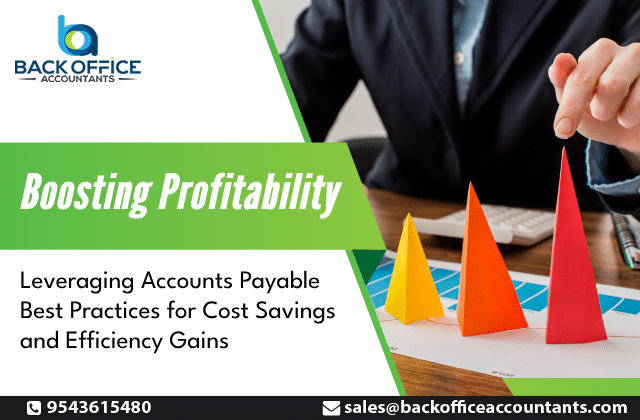Optimizing profitability is a primary objective for organizations across industries in today’s competitive business world. Accounts Payable (AP) is one frequently overlooked sector with substantial potential for cost reductions and efficiency advantages.
In addition to streamlining financial operations, efficient AP administration improves cash flow management and cultivates longer-lasting vendor relationships. Join us as we explore the methods and approaches that may transform AP administration and boost profitability to new heights.
The Value of Effective Accounting Payable Procedures
The value of Payable Procedures is found in its potential to improve productivity, simplify financial processes, and lower total costs for a company. By streamlining their accounts payable procedures, companies may reduce mistakes, minimize financial risk, and ensure on-time vendor payments. Effective accounts payable best practices enable more precise tracking and control of payment schedules, which improves cash flow management.
By doing this, the organization can make sure that money is spent wisely and that its supplier connections are maintained. Simplified procedures also allow companies to benefit from early payment reductions, which lowers total costs and boosts profitability.
Additionally, increased compliance with internal regulations and regulatory requirements is a result of efficient accounts payable systems. Organizations can reduce the risk of fines and audit problems by keeping correct records and following defined procedures.
Performance Evaluation
Accounts payable outsourcing-based performance review entails evaluating several critical variables to determine the efficacy and efficiency of the AP procedures. Analyzing variables including invoice processing times, accuracy percentages, and vendor satisfaction levels are common parts of this assessment. Businesses may measure the time it takes to process invoices from receipt to payment and discover any delays or bottlenecks that may need to be fixed by tracking invoice processing time.
To guarantee that payments are paid accurately and in compliance with vendor agreements, accuracy rates measure the number of mistakes or inconsistencies in invoice processing. Vendor satisfaction scores give information on how effectively the company is fulfilling the requirements and expectations of its suppliers, which is usually important for maintaining credibility and ensuring prompt delivery of goods and services.
Using Technology and Automation to Simplify Invoice Processing
- Electronic Invoicing: Converting from paper-based to electronic invoicing formats simplifies the process of submitting invoices, lowering the possibility of mistakes and the need for human data entry.
- Optical Character Recognition (OCR): This technology enables automatic data extraction and entry into accounting systems by converting scanned paper bills into editable digital text.
- Invoice Approval Workflows: By having automated processes in place, bills may be electronically sent to the right people for assessment and approval, which cuts down on delays and bottlenecks in the approval process.
- Integration with Accounting Software: Accurate financial reporting is ensured and the seamless transmission of invoice data is facilitated by the integration of accounting software and invoice processing systems. This eliminates the need for manual data entry.
- Payment Automation: Automated payment processing allows organizations to schedule and execute payments electronically, reducing the time and effort required to process payments manually.
Utilizing Analytics to Gain Understanding
Enhanced comprehension of financial data and improved operational effectiveness are provided by integrating analytics into accounts payable services. Complex financial information may be simplified into understandable visual representations like graphs and charts through data visualization.
Stakeholders can rapidly understand important trends and insights thanks to these graphics, which helps with well-informed decision-making. Additionally, expenditure analysis is made possible by analytics, which helps businesses find trends in vendor performance and spending habits.
Through this study, cost-saving options may be found, supplier negotiations can be supported, and buying choices can be optimised to increase profitability. Furthermore, by spotting irregularities and inconsistencies in payment and invoice data, analytics are essential to the identification of fraud.
Organizations can reduce risks and protect their financial integrity by reporting suspected cases of fraud or compliance breaches. Analytics also help with cash flow management by maximizing working capital and projecting future cash flows. Organizations can optimize cash reserves and ensure on-time supplier payments by analyzing accounts payable data in conjunction with other financial KPIs.
Final Overview
In today’s competitive corporate environment, streamlining accounts payable procedures is essential to improving profitability and operational effectiveness. Complete accounts payable processing services, such as electronic invoicing, OCR technology, processes for invoice validation, and payment automation, are the areas of expertise for Back Office Accountants.
They provide specialized solutions such as outsourced bookkeeping services to match the particular requirements of companies all across the United States due to their knowledge in financial reporting, reconciliation, and QuickBooks administration. Through the utilization of advanced accounting and bookkeeping tools and processes, Back Office Accountants enable firms to attain maximum financial performance and stimulate expansion.








